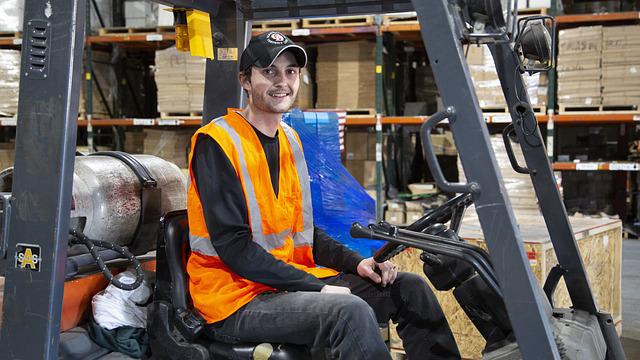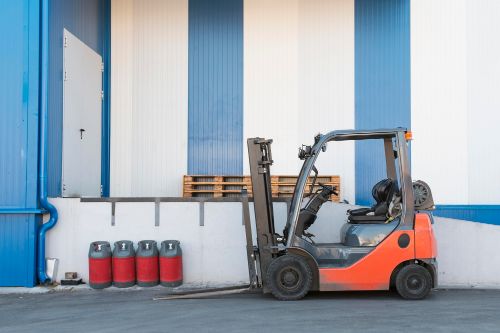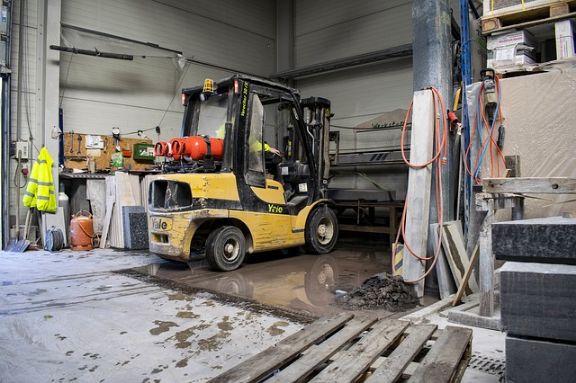
When managing a fleet of forklifts, ensuring a steady and safe supply of propane is crucial. Forklifts powered by propane are popular in various industries due to their efficiency and lower emissions compared to other fuels.
However, maintaining an uninterrupted fuel supply involves more than just having enough tanks; it requires a reliable propane tank exchange system. This article is designed to guide you through the process of finding a competent and trustworthy company or supplier for this service.
Understanding the nuances of such a service is essential for any business relying on propane-powered forklifts. A good supplier doesn’t just deliver propane; they offer a partnership that includes timely exchanges, safety inspections, and compliance with all relevant regulations.
In this guide, we will explore the key factors you should consider when choosing a supplier, from their safety record and reliability to the convenience and cost-effectiveness of their service.
Whether you’re a small business or a large enterprise, finding the right supplier is a step toward enhanced operational efficiency and safety. Let’s delve into how you can make an informed decision that keeps your forklifts running smoothly and your operations seamless.
Finding a Propane Tank Exchange Supplier
With a little bit of planning, exchanging your forklift’s tank can be a quick and easy process. Here are the companies where you can get in contact with to exchange your cylinders:
- Freeman Gas, Inc.
511 S Shady Street, Mountain City, Tennessee 37683, Phone: (423) 727-2597
72 Crossing Drive, Blairsville, Georgia 30512, Phone: (706) 781-1669
57 Hwy 2, Blue Ridge, Georgia 30513, Phone: (706) 632-1951
1994 J A Cochran Bypass, Chester, South Carolina 29706, Phone: (803) 581-1130
3802 Cherokee Ave., Gaffney, South Carolina 29342, Phone: (864) 489-8577
1740 Rosman Hwy, Brevard, North Carolina 28712, Phone: (828) 883-3230
10595 NC Highway 105, Banner Elk, North Carolina 28604, Phone: (828) 898-7986
- American Cylinder Exchange
Louisville, KY, (502) 424-5219
San Antonio/Austin, TX, (830) 733-2953
Greater Atlanta, GA, (770) 904-2892
Pensacola, FL / Mobile, AL, (251) 981-9473
- Admiral Propane
2002 Highway 75, Blountville, TN 37617, 423-212-1057
1145 Forest Street, Greeneville, TN 37664, 423-278-9891
- Parker Gas Co. Inc.
Smithfield, NC: 919.300.4311
Newton Grove, NC: 910.249.4088
Fayetteville, NC: 910.359.3141
Clinton, NC: 910.682.3151
Wilmington, NC: 910.319.4070
Mt. Olive, NC: 919.551.4170
- Pacific Coast Propane
Ontario District (800) 307-0058
San Diego District (844) 616-1075
Phoenix District (844) 351-1075
- James O2
PO Box 159, 30 US Hwy 321 NW, Hickory, NC 28603, 828-322-5438
106 Grove St., Boone, NC 28607, 828-264-5098
621 2ND ST., N. Wilkesboro, NC 28659, 336-667-7605
2849 NC 226 S, Marion, NC 28752-7775, 828-559-0807
- Pico Propane & Fuels
7717 Broadway Blvd. SE, Albuquerque, NM 87105, Phone: 505-431-2018
6315 Hwy 347, Beaumont, TX, 77705, Phone: 409-257-7525
323 South Sunset Strip, Kenedy, TX 78119, Phone: 830-299-7807
- Forever Propane Sales & Service Inc.
350 NE 44th St, Oakland Park, 954-932-2616
1060 SW 27th Ave, Miami, 786-761-7122
- Boehlke Bottled Gas Corporation
1020 Hwy 60, Cedarburg, WI 53012, 262‑228‑6294
- Lava Propane
1298 Distribution Way, Unit B, Vista, CA 92081, (866) 867-1624
- Blue Flame Propane
28 Gorgo Ln, Newfield, NJ 08344, 833-628-1632
Finding the right supplier, whether local or national, involves a series of steps. Here’s a guide to help you through the process:
- Identify Your Needs: Before you start looking, clearly define what you need in a service. Consider factors like the size and number of tanks, frequency of exchange, delivery options, and any specific requirements your business has.
- Start with Online Directories: Use online directories to find a list of suppliers. Websites like Yellow Pages, Yelp, or industry-specific directories can provide a comprehensive list of suppliers in your area.
- Check Industry Associations: Industry associations are a great resource. They often have member directories where you can find reputable suppliers. Associations like the National Propane Gas Association (NPGA) in the United States can be particularly useful.
- Utilize Search Engines: A simple Google search can yield valuable results. Search for “propane tank exchange suppliers near me” or specify your location to find local options. For national suppliers, broader search terms like “leading propane tank exchange suppliers in [country]” can be helpful.
- Read Recommendations and Reviews: Online reviews on platforms like Google Reviews, Trustpilot, or even social media can give you insights into other customers’ experiences with specific suppliers. Pay attention to comments about reliability, customer service, and safety practices.
- Consult Peers and Colleagues: Word-of-mouth recommendations are often invaluable. Ask other businesses in your network where they get their tanks exchanged and what their experiences have been.
- Attend Trade Shows and Expos: Industry events can be a great opportunity to meet suppliers face-to-face. These events often bring together a variety of vendors and can give you a feel for their services and professionalism.
- Request Quotes: Once you have a shortlist of potential suppliers, request quotes. This will give you a clear idea of pricing and allow you to compare different suppliers on a like-for-like basis.
- Evaluate Customer Service: Consider contacting their customer service with queries to gauge their responsiveness and helpfulness. This can be an indicator of the kind of service you can expect in the future.
- Check for Additional Services: Some suppliers might offer additional services like tank maintenance, emergency services, or flexible delivery options. These can be valuable additions to the basic propane service.
- Make a Decision: After considering all these factors, make an informed decision based on which supplier best meets your business’s needs, budget, and expectations for service quality.
Remember, the right supplier for you will be one that aligns with your specific requirements, offers reliable and safe service, and has a track record of satisfied customers. Take your time to research and choose the supplier that best fits your business’s needs.
Exchanging vs Refilling: The Former is Better
| Aspect | Propane Tank Exchange | Propane Tank Refilling |
|---|---|---|
| Convenience | High – Tanks can be quickly exchanged with minimal downtime. | Lower – Requires taking tanks to a refill station, which can be time-consuming. |
| Safety | Enhanced – Tanks are regularly inspected and maintained by the supplier. | Variable – Depends on the operator’s adherence to safety protocols during refilling. |
| Consistency | More Consistent – Exchanged tanks are filled to exact specifications, ensuring consistent fuel quality and quantity. | Less Consistent – Refilling can lead to variations in fuel quality and quantity. |
| Cost-Effectiveness | Potentially More Cost-Effective – Fixed costs and no need for refill equipment or training. | Can be Less Cost-Effective – Involves costs for refilling equipment and staff training. |
| Time Efficiency | Higher – Exchange services are quick and do not require waiting for refills. | Lower – Time spent in transportation to refill stations and waiting for the refill process. |
| Compliance with Regulations | Easier Compliance – Exchange services ensure tanks meet current safety and regulatory standards. | Responsibility Shifted – Operators must ensure compliance with safety and regulatory standards during the refill process. |
| Environmental Considerations | Better Controlled – Suppliers often have systems in place for environmental safety. | Operator Dependent – Environmental impact depends on the operator’s practices. |
| Maintenance and Inspection | Handled by Supplier – Regular inspections and maintenance are part of the exchange service. | Operator’s Responsibility – Operators must conduct regular inspections and maintenance. |
| Emergency Handling | Supplier Support – Suppliers may offer emergency support and guidance. | Solely Operator’s Responsibility – Operators must handle any emergencies independently. |
| Flexibility | More Flexible – Allows for scaling up or down based on business needs without additional equipment investment. | Less Flexible – Limited by the capacity of refill equipment and availability of refill stations. |
How to Choose a Propane Tank Supplier
When choosing a supplier, consider the following advice:
- Assess Reliability: You want a supplier who consistently delivers on time and meets your needs without any hiccups. Check their track record and customer reviews to gauge their reliability.
- Compare Costs: Don’t just look at the price. Consider any additional fees, like delivery charges or minimum order requirements. Find a balance between cost and the quality of service.
- Evaluate Safety Record: Safety is paramount. Investigate the supplier’s safety record and their adherence to industry standards. A good supplier will have a clear safety protocol and a history of few accidents or incidents.
- Check for Compliance: Ensure the supplier is compliant with all local, state, and federal regulations. This not only protects you legally but also ensures that you’re working with a professional and responsible entity.
- Consider Local vs National Suppliers: Local suppliers might offer more personalized service and quicker response times. However, national chains can provide broader services and potentially better pricing due to larger-scale operations. Consider which aspects are more important for your operations.
- Analyze Service Terms: Read the fine print of the service agreement. Understand the terms for tank exchange, delivery schedules, and any penalties for contract termination or changes.
- Seek Recommendations: Ask other businesses in your network about their experiences with different suppliers. Personal recommendations can provide valuable insights that you might not find online.
- Evaluate Customer Service: Good customer service is crucial, especially if you run into issues or have special requests. Call their customer service line to test responsiveness and helpfulness.
- Consider Environmental Practices: If sustainability is important to your business, look into the supplier’s environmental practices. Some suppliers might offer eco-friendlier options or have better waste management practices.
- Plan for Future Needs: Think about your future requirements. Will the supplier be able to scale up services if your business grows? Flexibility and scalability are important factors to consider.
Remember, the right supplier is not just about the cost. It’s about reliability, safety, compliance, and a partnership that aligns with your business values and needs. Take your time to research and choose wisely.
Key Considerations When Setting Up a Service Agreement
When setting up a service agreement, it’s important to approach the process with care and attention to detail. Here are some key considerations to guide you:
- Understand the Service Terms and Conditions:
- Carefully read the entire agreement. It’s crucial that you fully understand what you’re agreeing to.
- Look for any hidden fees or clauses that might affect your service down the line, like late fees or minimum order requirements.
- If there’s anything you don’t understand, don’t hesitate to ask the supplier for clarification.
- Negotiate Prices and Delivery Schedules:
- Don’t accept the first offer. See if there’s room for negotiation on price, especially if you’re committing to a long-term agreement.
- Discuss the delivery schedule in detail. Ensure that it aligns with your business operations and demand patterns.
- Consider asking for a price lock or a cap to protect your business from price fluctuations in the market.
- Ensure Regular Maintenance and Safety Checks:
- Confirm that the supplier provides regular maintenance and safety checks as part of their service. This is crucial for safe and efficient operation.
- Ask about the supplier’s protocol for emergency situations or if a tank is found to be faulty.
- Inquire about training for your staff on how to handle and connect the tanks safely.
- Look for Flexibility in the Agreement:
- Ensure that there’s some degree of flexibility in the agreement. You might need to adjust your order quantities or delivery frequency as your business evolves.
- Check the terms regarding contract termination or modification. Avoid getting locked into an agreement that doesn’t allow for changes.
- Review Liability and Insurance Clauses:
- Understand who is liable in different scenarios, such as accidents or equipment failure.
- Confirm that the supplier has adequate insurance coverage. This protects both parties in the event of unforeseen circumstances.
- Seek Legal Advice if Necessary:
- If the agreement is complex or involves significant investment, it might be wise to consult with a legal professional.
- A legal expert can help identify any potential issues and ensure that your interests are well protected.
Remember, a service agreement is a commitment. It’s important to enter into it with a clear understanding of all aspects. Don’t rush the process – take your time to negotiate and ensure that the agreement meets your business’s specific needs and expectations.
Best Practices You Need to Follow
Implementing best practices for exchange is essential for ensuring safety and efficiency in your operations. Here’s some advice to guide you:
- Train Employees on Safe Handling Procedures:
- Conduct regular training sessions for all employees involved in handling propane tanks.
- Ensure they understand the correct methods for connecting and disconnecting tanks, as well as the proper ways to transport and store them.
- Keep training updated with the latest safety protocols and procedures.
- Establish Regular Inspections and Maintenance Schedules:
- Implement a routine inspection schedule for all propane tanks and associated equipment.
- Check for leaks, rust, or any damage that could compromise the tank’s integrity.
- Ensure that maintenance is performed by qualified personnel and that any issues are addressed promptly.
- Develop Comprehensive Emergency Procedures and Safety Measures:
- Create a clear set of emergency procedures in case of a propane leak or other hazardous situations.
- Ensure that all employees know how to respond in an emergency, including how to use fire extinguishers and emergency shutdown procedures.
- Regularly review and practice these procedures to ensure everyone is prepared.
- Use Proper Personal Protective Equipment (PPE):
- Provide appropriate PPE such as gloves, goggles, and other protective gear, and ensure employees use them when handling propane tanks.
- Regularly check the condition of the PPE and replace it as necessary.
- Keep Clear Documentation and Records:
- Maintain accurate records of all training sessions, inspections, maintenance activities, and any incidents that occur.
- These records can be crucial for identifying trends, improving safety practices, and providing evidence of compliance with safety regulations.
- Stay Informed About Regulatory Compliance:
- Keep up to date with local, state, and federal regulations regarding propane storage and handling.
- Regularly review your practices to ensure they comply with these regulations.
- Establish Clear Communication Channels:
- Ensure that there are clear lines of communication between your team members, especially those directly involved in the process.
- Encourage employees to report any safety concerns or potential hazards.
- Engage with Your Propane Supplier for Support and Advice:
- Your propane supplier can be a valuable resource for best practices and safety advice.
- They can provide specific information about the tanks you’re using and may offer additional training resources.
Remember, the key to best practices is ongoing vigilance, regular training, and a commitment to safety at every level of your organization. Prioritizing these aspects will not only keep your employees safe but will also ensure efficient and uninterrupted operations.
How to Exchange Forklift Propane Tanks
It is a process by which a used forklift propane tank is exchanged for a new or refilled tank. The process typically involves the removal of the used tank from the forklift, followed by the installation of the new or refill tank. In some cases, the forklift propane tank may be swapped for a different size or type of propane tank.
FAQs About Propane Tanks
When you’re looking to exchange your propane tank, it’s important to know the answers to some common questions so that you can make the best decision for your needs. Here are some frequently asked questions:
- What is propane tank exchange?
Propane tank exchange is the process of exchanging your old propane tank for a new, filled one. This is a convenient option for those who use propane regularly, as it eliminates the need to bring your own tank to a propane filling station.
- How much does it cost?
The cost will vary depending on the provider and the size of the tank. However, you can expect to pay around $50-$70 depending on the size and capacity of the tank.
- How often do I need to exchange my propane tank?
This will depend on your usage. If you use propane regularly, you may need to exchange your tank every few months. However, if you only use it occasionally, you may be able to get by with exchanging it once a year or even less.
- What should I do with my old propane tank?
Once you’ve traded your old propane tank for a new one, you can either recycle it or dispose of it properly. Many propane providers will take back your old tank and recycle it for you, so be sure to ask about this option when you trade your tank.
- I have a propane tank that I’ve never used. Can I still exchange it?
Yes, you can still exchange an unused propane tank. However, you may need to pay a small fee to have the tank inspected and filled before it can be swapped.
Propane tank exchange is a convenient option for those who use propane regularly. By exchanging your old propane tank for a new one, you can save yourself the hassle of having to bring your own tank to a propane filling station.

Mike is an experienced propane technician with over 15 years of professional experience in the field. He has dedicated his career to helping customers with their propane needs, from installation to maintenance and repair. Together with Jeremy, he co-founded this website to provide useful information and guidance to customers seeking reliable propane services.




